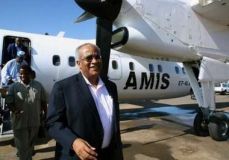AU envoy holds tempestuous meeting in Darfur
August 26, 2007 (EL-GENEINA, Sudan) — African Union envoy Salim Ahmed Salim, seeking support from west Sudan’s Darfuris for a ceasefire and peace talks, had a stormy reception when he met community and tribal leaders on Sunday.
 Some of those Salim met at the African Union base in the town of el-Geneina walked out, accusing him angrily of favouring rebel groups.
Some of those Salim met at the African Union base in the town of el-Geneina walked out, accusing him angrily of favouring rebel groups.
Salim was meeting leaders of the millions who have fled their homes during 4-1/2 years of conflict and live in miserable camps across Darfur — university professors, community workers and lawyers — and asking them how best to tackle peace talks due in October.
“We want to listen to you,” was Salim’s message as he missed a formal lunch to demonstrate his commitment to hearing their points of view.
Salim and his U.N. counterpart, Jan Eliasson, are trying to regain the confidence of the 4.2 million people displaced by the conflict and reliant on aid, and get all Darfur’s population involved in the new talks.
Salim was head of mediation during Darfur peace talks which lasted almost two years and resulted in an imperfect deal which only one of three rebel negotiating factions signed last year.
After six hours’ flying, and facing a 6 p.m. curfew at Darfur’s main airport in el-Fasher, Salim spent more than two hours talking to civil society and camp leaders, angering Arab tribal leaders who were then told they had only five minutes of his time.
“You spend weeks and months … talking to the armed groups … but for us you have only five minutes,” said Mohamed Salih al-Amin Baraka, spokesman for the nomadic Arab tribes.
“Either you give us the full time allocated to us or we will just leave,” he said, supported by angry snorts of agreement from other Arab leaders.
REBELS DIVIDED
Those who rebelled against Khartoum in early 2003, accusing it of marginalising remote Darfur, were mostly non-Arabs. Those who answered the government’s call for popular defence by forming militias to quell the revolt were mostly Arab tribes.
The rebels negotiated with the government, but since last year’s deal they have split into more than a dozen factions, complicating new talks. The Arab militias had no seat at the talks and feel left out of the political process.
Salim got a better reception from civil society leaders, who showed their discontent with the armed groups.
Community worker Lena Fatha Rahman said civil society, as well as rebels, should have seats at talks. “Why do we only give seats to those who take up arms? This means any employee will take up arms to get what he wants from his employer,” she said.
Izzeldin Adam Abdelrahman from Mornei Camp said: “We must pressure the government and those who have not signed the deal … to come to peace talks … But the first priority is to disarm all armed groups.”
On Monday Salim traveled to Zalengei, birthplace of the hugely influential founder and chairman of the rebel Sudan Liberation Movement (SLM), Abdelwahid Mohamed al-Nur.
Nur has refused to join the rebel commanders and factions returning to the negotiating table until an international U.N.-African Union force is sent to Darfur to put an end to rape, killing and looting.
But Salim said talks were the only way to achieve that and urged Nur, living in Paris, to come to the negotiating table.
“I accept Abdel Wahed’s position,” he said. “(But) what I don’t accept is to say that unless we have absolute security it is not worth it, because at the end of the day it is the negotiations which will ensure durable security.”
Nur has few loyal troops in Darfur but massive support among the largest Fur tribe. Hundreds of thousands say they will only accept a deal that he has signed.
International experts estimate 200,000 have died and 2.5 million have been driven from their homes during the fighting.
(Reuters)
